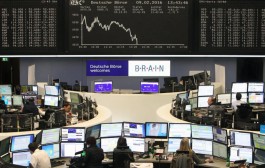Stocks in Asia rose largely at the start of a busy week of major central banks' monetary policy decisions, coinciding with slowing gains in Chinese stocks, as investors await signs of Beijing offering more stimulus measures.
Japanese stocks rose, supported by a report late Friday that indicated that BoJ officials do not believe there is an urgent need to address the side effects of the bank's ultra-loose monetary policy. Shares of Steelmaker Posco Holdings Inc jumped a record 24%, after the company reported quarterly earnings that beat expectations for the second quarter of the year. This big jump sent the Kospi index up 1%, close to its highest level since mid-June.
The picture in Hong Kong and China was not the same as in Tokyo, where stock prices fell after Chinese stocks ended last Friday, recording their worst week in four weeks, despite a series of pledges made by Beijing regarding boosting consumption and supporting companies. Global fund managers are anticipating more weakness in China's markets, regardless of the policy of strong support for the economy that some are waiting for the expected meeting of the Chinese Communist Party's Politburo.
Chris Watson, head of research at Pepperstone Group, wrote in a note: The market is widely anticipating that there will be more stimulus, but has so far refrained from expressing such a strong view in financial assets.
At the same time, concerns about Dalian Wanda Group Co's ability to repay the dollar bonds it owes may recede, after the company raised 2.26 billion yuan ($314 million) from the sale of an asset. Concerns about defaults have led to sharp swings in the prices of its bonds and those of similar Chinese companies in recent weeks.
US stock contracts generally stabilized in Asia today, Monday, after the Standard & Poor's 500 index closed slightly changed on Friday, at a time when the Nasdaq 100 index was affected by the continued selling of technology stocks after a series of disappointing financial results.
The Yen rose after losing more than 2% of its value last week, particularly after the Bank of Japan report, while most of the major currencies today traded within tight ranges against the US dollar.
US Treasury yields moved slightly during Asian trading sessions, while Australia and New Zealand's long-term bond yields declined.
Watch for central bank decisions
Quarterly business results and central bank decisions will be the focus of investors' attention during the current week. The results of major US companies, including Alphabet, Exxon Mobil and Metaplatforms, are scheduled to be announced, while investors in Asia will watch the results of companies such as Samsung Electronics and Hitachi.
Investors also expect interest rates to be raised by the US Federal Reserve and the European Central Bank, and that there will be signs of further monetary tightening, while the Bank of Japan is expected not to change its monetary policy in light of expectations of sustainable inflation, which will make the interest rate gap widen with its peers from global central banks.
In a note to clients, Win Thein, global head of currency strategy at Brown Brothers Harriman, wrote: The Fed should not signal that it will not change interest rates at the September meeting, as it did at the June meeting, which is already constraining (the Fed) at a time when it needs maximum flexibility. He added: Given how stable the labor market is, we think the best thing for the Fed to do is to emphasize a more data-driven approach, and to stress that a rate change should not be assumed in September.
In commodities markets, Oil fell after posting 4-week gains, amid initial signs that global markets are under supply pressure. As for gold, it started the week with little change, after declining against the strong dollar on Friday.







































